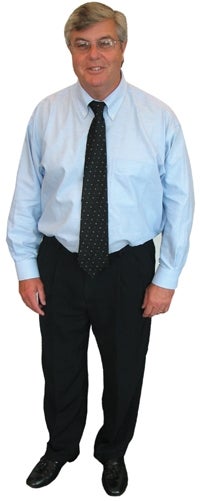Ernest “Ed” O’Brien joined Cutler Associates, a Worcester-based firm that does both commercial design and construction, in February 2007. He came on board as executive vice president of operations, but was recently name president, taking over for Frederic Mulligan, who had held the president post for the past 25 years. Mulligan remains with the firm as chairman. Here, O’Brien discusses his experience as well as the staying power of the “green movement” in the construction industry
>> How did you get to where you are today?
I graduated in 1977 and the economic climate then was not quite as abysmal as it is today, but it was similar. So, I went on the road for a number of years, travelling and working on construction projects. I came back to New England in the early 80s and over a short period of time I became president of the Stone Co. I left there and went to Maine and formed Grainger Northern. I came back here, spent two years with Dacon, a direct competitor of Cutler in Natick, and I came to Cutler in February 2007.
>> What drew you to civil engineering?
I’d like to say it was some kind of great divine revelation, but really, I was interested in the design aspect of the business, particularly structural design. Very early on in my career I came to the conclusion that design would be boring and that building was much more exciting.
>> I think a lot of people would think it’s the opposite — that design is the creative, exciting part of the industry.
Most designers spend 362 days of the year in the confines of their office. When I started in the business they would have a pen or a pencil in their hand and they’d be drawing lines on a piece of vellum. Nowadays they’re banging on the keys of the computer, but it’s largely a two-dimensional job. Construction is a three-dimensional job.
>> How’s the economy doing from your perspective?
You can only look at these things backwards to know how bad they are. You can’t sit in the middle of them and say that this is the worst. It feels like it might be the worst. We’ll have to look back on it five, six years from now to really tell. From our viewpoint, the national numbers would indicate that construction starts in 2008 were off substantially.
>> Are there any areas of your business that have been more resilient?
Counter-intuitively, our Florida office in Tampa has stayed very busy. And the product that we’re engaged with there is public schools. Health care is still an area where there’s a lot of construction activity and the last area would be our private scholastic market — secondary education, colleges and universities.
>> So much of the last year has been marked with indecision. Businesses have been afraid to move on projects because of uncertainty. Are you seeing a change in that area?
There’s still a lot of indecision. But when the market collapsed in September, there were a lot of projects teed up that got put on the shelf for the sole reason that they couldn’t be funded. Those projects are still viable today and I think when things start to move, there’s going to be a fairly large amount of work that pops out of the pipeline quickly.
>> Building with green and sustainable practices is obviously a hot topic in your industry. Do you think it’s a fad, or is green here to stay?
There are probably elements of it that are a fad, but I think everybody realizes that we have to become much more responsible with the use of our resources. Sustainability, green construction, whatever you want to call it, is being required at just about every level now.
>> What’s the hardest management lesson you had to learn?
I think every manager has the same dilemma, which is finding the right amount of personal attention and the right amount of the delegation. It’s a delicate balance between what you spend your time on. Finding that right balance is probably key for every manager and it’s been the key for me.

